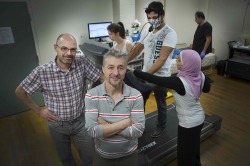Healthy obesity through fitness

Obese and fit are two words most people do not usually associate; however, through an upcoming project a group of researchers at Memorial University is seeking to explore this idea.
Dr. Fabien Basset, associate professor with the School of Human Kinetics and Recreation and Dr. Denis Joanisse, associate professor in the Department of Kinesiology at Université Laval who is visiting Memorial on sabbatical, are collaborating to look at the effect of moderate physical activity on four distinct groups.
The groups will consist of an overweight fit group, an overweight sedentary group, a lean fit group and a lean sedentary group with fit being determined by physical activity capacity and endurance.
“Increasingly we understand that it’s more important to improve health and positively impact how a body works, not what it looks like,” said Dr. Joanisse. “We want to help shift the conversation from a focus on weight to one about fitness and health. Understanding how fitness can control the metabolic profile of obesity is an important step in developing better strategies to improve the health of patients.”
The novelty of their project resides in its experimental design that shows how as the result of being physically active, obese but fit individuals are protected from many adverse health conditions such as metabolic syndrome, insulin resistance, non-insulin dependent diabetes mellitus, increased blood pressure, and cardiovascular disease.
“We want to understand the metabolic activity in play when we challenge bodies in the same way, but they react differently,” said Dr. Basset. “Metabolic challenge induced by physical activity involves the transformation of energy and matter in the body and these reactions maintain life. Therefore, if we have an understanding of how to positively influence metabolic activity we can potentially improve quality of life.”
This project, which has received funding from the Mitacs Accelerate Program will provide evidence on the actual contribution of fitness to metabolic health and how this happens in the body. It will provide objective measures to more effectively evaluate the risk to patients and guide clinicians and researchers to provide targets for lifestyle objectives.
“This high-quality applied health research aligns well with key research themes in Newfoundland and Labrador,” explained Dr. Basset. “The findings could contribute to the effectiveness of the health care system in the province and beyond to address important health issues related to obesity.”
Dr. Basset has an interest in metabolic disorders induced by environmental factors. Dr. Joanisse is interested in the area of metabolic health in humans particularly insulin resistance. Together, in a multidisciplinary approach to this research, they are bringing together professors from exercise physiology to biochemistry in order to increase their capacity to answer the question what is the impact of fitness on metabolic health of obese individuals.
In addition to Drs. Basset and Joanisse, members of the team from Memorial include Dr. Sukhinder Cheema and Dr. Vikram Chandurkar. Dr. Cheema is an associate professor with the Department of Biochemistry. She will be providing analyses and assist in the interpretation of the data. Dr. Chandurkar is an assistant professor with the Faculty of Medicine. He will assess the medical condition of the participants in addition to assisting in understanding and interpreting the data related to metabolic health and endocrinology.
This research will happen during the fall of 2015. For more information, contact fbasset@mun.ca. RDC is a proud sponsor of Mitacs.